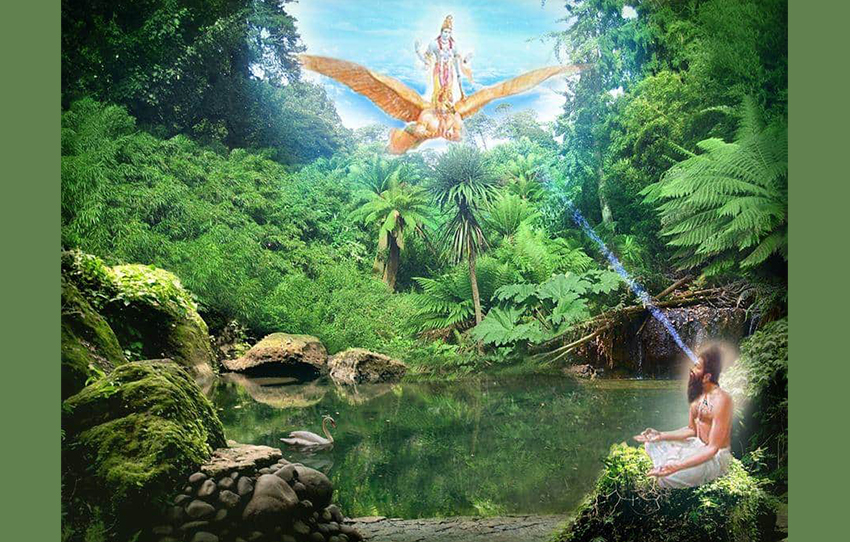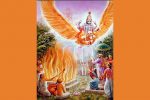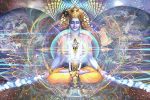NAME 4
Bhūta-bhavya-bhavatprabuḥ
भूत-भव्य-भवत्प्रबुः
Viṣṇu is the Lord of time, past, present and future. This refers nāma to His eternity. Only the Brahman can be beyond time. Bhūta-bhavya-bhavat refers to past, future and present and prabu is a declaration of His Supremacy. If a spiritual aspirant is able to transcend time, he realizes the Brahman. All changes in the physical world are described in terms of a separate dimension called time. Since the Brahman is subtle in nature, he stands transcended the time factor.
Kṛṣṇa says in Bhagavad Gita (VII.26), “Arjuna, I know all beings, past, present and future”.
४. ।।ॐ भूत-भव्य-भवत्प्रभुवै नमः।।
4. Om Bhoota Bhavya BhavatPrabhave Namaha।।
Bhoota-bhavya-bhavat-prabhuh – He who is the Lord (Prabhu) of the Past (Bhooita), the Future (Bhavya) and the Present (Bhavat). Time is the concept of the intellect; it expresses itself in the interval between experiences. Experiences are registered as thoughts and thoughts are ever changing. This very change is known and experienced by us. The knower of the change must be something other than the change. Thus, He who is the Illuminator of all changes, meaning the Consciousness (Aatman) is the Lord Vishnu. He is the One who is not conditioned by time.
Meaning:
One who is the lord of all things past, future and present.
It is actually sufficient to just say that God is the owner of the past and future. It is understood that HE is the master of the present as well.
INTERPRETATION GUIDED BY SANT VANI (WORDS OF SAINTS)
Bhūta-bhavya-bhavat-prabhuḥ – Viṣṇu is the Lord of the past, future and also the present.
A visual example to assimilate this better – Ganga originates from Gomukh in the North, flows southwards and then eastwards where it meets the sea at Gangasagar. Imagine yourself standing at a distance from Ganga, facing the East. The water that has already flown can be likened to the past, the waters you are facing are the present and the waters that are still to come are the future.
Further imagine that a satellite view of the entire stretch of the river was possible – the waters that are originating from the glacier, waters that are flowing and waters that have flown into the sea. The past, present and future are available to you at that moment. You are not bound by what you see. Bhagavān is the Lord of time but, He is not bound by time. So for Bhagavān, the entire kalpa, cycle is the present alone. Creation and so on is in the present tense. Every moment, a ‘moment’ is born, a‘moment’ is gone and a ‘moment’ is to be born.
When it is said that Viṣṇu is the Lord of the past, He does not become the past. It is not as if He ‘was’. Bhagavān creates, sustains and withdraws the creation all the time. Therefore, He is the Lord of time–the past, present, future from a standpoint, and hence, is not bound by time. Is He then outside time, that is, different from time? No, because time is the Lord.
Brahman is the ātmā, the self, that is the limitless consciousness, that which exists in all three periods of time, is timeless and time also. Therefore, time is not independent of timelessness. If time is analyzed, we find that past was always present. There is really no past. A lot of people say they need to deal with their past issues. Really speaking, nobody has to or can deal with the past. What people need to deal with is either the memory or the perception of past issues as they occur in the present, especially when these residual reactions from the past are spilling onto the present.
The past can never be thought of in the past. It can be thought of only in the present. So, past is the present thought. The future is also thought of only in the present. The past was ‘present,’ future will be ‘present,’ and the present is, of course, ‘present.’ If the present implies a certain length of time, then a valid question is ‘what is the length of time of the present?’ The present can be reduced to the present kalpa, present millennium, present century, present decade, present year and further into present hour, minute, second, micro-second and this can be further reduced mathematically. In all these, there is the consciousness of time. When you are thinking of a length of time, there is time-consciousness. Without the presence of consciousness, there is no time. So, what is the present? That consciousness alone is the present. The present ‘is.’ Hence, the truth of time is timeless consciousness, which is eternity. Eternity is not in time. The non-eternal time is sustained by eternal, timeless consciousness. In fact, there is no time. What is there is only timeless consciousness.
Chronological time is entirely dependent on the limitless consciousness, which is sat, chit and ānanda. This is the truth of everything, the truth of time and therefore the truth of Īśvara.
Time is Īśvara, but time is not self-existent.
Light travels at 180,000 miles per second. Our scientific understanding of time and motion are based on this assumed constant, the speed of light. However, this itself is not a constant. It is relative, because it is motion. Therefore, time is not constant. When you talk of a pot, the clay is present. When you talk of a shirt, there is fabric. When you talk of time, there is consciousness. When you talk of the clay, there is consciousness. When you talk of the fabric, there is consciousness.
Therefore, the only thing, which is satya, is ātmā, Brahman. That is Viṣṇu and He is bhūta-bhavya-bhavat-prabhu, the Lord of the past, present and future. He is the timeless, limitless consciousness.
Bhoota-Bhavya-Bhavathprabhu is the fourth name of Vishnu and completes the first sentence of the Shloka:
विश्वं विष्णुर्वषट्कारो भूतभव्यभवत्प्रभुः ।
As he is the “Universal-All” (Viswam), “He who is everywhere” (Vishnu) and to “Whom all that is offered in the yajna (besides being the yajna itself) and the doer/receiver” (Vashakaraha), it stands to reason that he is also the “Master of the Past, Present, and Future” which is what the fourth name (Bhootabhavyabhavatprabhuhu) means.
It is not really necessary to mention the “Present” It is understood that the past, present, and future are a continuum and he who is the master of the past and the future must necessarily also be the master of the present.
We see this brought out in the Purusha Suktam where we come across the line: “Purusha Evedam Sarvam Yad Bhutam Yaccha Bhavyam….” meaning the Purusha is the whole Universe and is representative of all that “has been” and all that “will be”
It further means that he is beyond the vicissitudes of time and outside its all-encompassing sway. He is eternal, immutable (unchanging over time), and beyond the clutches of decay an death. He is that supreme being that is not ‘conditioned’ by Time.
Two passages from the Narayaneeyam which is a poetic condensation of the essence of the Bhagavata, bring out the glory of this name of that eternal being:
“In the beginning when it was Brahma-Pralaya, there was nothing in existence either gross or subtle. For Maya, Thy cosmic creative power, with its active phase neutralized by the relapse of the three Gunas into equipoise, had gone into the state of latency in Thee. Neither death not death-lessness, neither day-time nor night existed. Only Thou without a second, remained as supreme “Bliss-Consciousness”.
“Then, Kala (Time), Karma, Prakriti (Nature), and Jivas – in fact all entities of the nature of effects had attained dissolution in Thee, while Thou didst sport in the bliss of supreme pure consciousness in thy state of cosmic slumber. The above entities cannot be said to have to have been naught at that time; they had become only latent in Thy cosmic power. Otherwise if they had perished and become non-entities, how could their re-emergence (in the new creative cycle) be possible?”
— Canto-5 [COSMIC EVOLUTION]; NARAYANEEYAM of Mepapathur Narayana Bhattatiri; Translated by Swami Tapasyananda; Sri Ramakrishna Math, Madras Publications; 1982
In the first shloka of 4th chapter of the Bhagavad Gita – Jnana-Karma-Sanyasa-Yoga, Sri Krishna refers to his unconditioned stare of “timelessness”.
श्रीभगवानुवाच |
इमं विवस्वते योगं प्रोक्तवानहमव्ययम् |
विवस्वान्मनवे प्राह मनुरिक्ष्वाकवेऽब्रवीत् || 1||
śhrī bhagavān uvācha
imaṁ vivasvate yogaṁ proktavān aham avyayam
vivasvān manave prāha manur ikṣhvākave ’bravīt
“I taught this imperishable Yoga to ‘Vivasvat’ i.e. Surya and then to Manu and Manu taught Ikshavaku”.
“He is the real ‘Prabhu’ for he is beyond the sway of Time and the master of the past, present, and future”.
Please watch this insightful video below to understand this name in its true essence:



